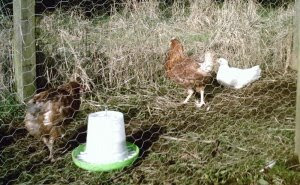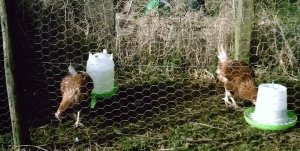
So my first Hens are here :D
As the kids are going through a Tim Burton stage at the moment they are names Emily and Victoria (From corpse bride) and Sally (From the nightmare before Christmas).
I thought I would use this post as an opportunity to debunk the free range myth.
In the UK (and else where I expect) Eggs are graded in 3 main ways, caged bird, barn reared or free range (lets leave organic out of it).
As everyone knows caged birds are kept in cages, unable to stretch, dust bath or scratch about as nature intended. Barn reared birds are usually free to roam inside a large barn but are not allowed outside. Free range birds get to frolic in the sunshine, pecking for worms and generally have a fine old time right?
Erm..no actually.
In THEORY this should be the way it happens but it has to be remembered that even free range commercial flocks have to be run at a profit.
The free range set up is similar to the barn set up but with ACCESS to enclosures outside. But lookie here, we have a barn with 300 chickens in it...but only 10 (or less) pop holes. What usually happens is that the dominant hens go outside the prevent the lower ranking chickens from leaving the barn, so your free range bird may never have seen the sun light and is no more free range than her barn reared cousin.
OH BUT ...its FREE RANGE!! So the price tag upon the box of eggs goes up steeply, but you the consumer are being played for a mug....you are paying for the box, the one that say's free range...the one that implies you care.
There is also the fact that as a commercial flock even the free range hens will be culled at the first moult. No farmer is going to loose money feeding a non productive bird that will then lay slightly fewer eggs.
I read a feature online a while back about the Battery hen welfare trusts work with farmers. Many farmers they are working with are moving away from caged hens and into barn rearing but are frustrated at the problems that go with it.
At great expense they convert their buildings for barn rearing, letting chickens spread their wings and scratch and interact with each other...but no one will buy their eggs...Why??
Well...the person who doesn't care will buy the cheapest and producers of food that include egg or egg products will also only use the cheapest (cakes, mayonnaise etc).
The people who DO care mistakenly think that free range is far superior to barn reared and so will bypass the barn reared eggs.
The poor farmer is left loosing money and then possibly his lively hood...all because he wanted to farm in a kinder way.
So for the record, the next time I have to buy commercial eggs I will save myself some money and buy local barn reared ones and hopefully support a farmer who is working towards a better standard of welfare for his flocks.


All calm so far :P



Thanks for the edu-macation...I was honestly unaware of this. The only eggs I bother with are the extra Omega 3 ones...not sure what the Canadian standards are, but when I went to my first Agricultural show and saw battery hens, I cried. moreso than I did for the calves/cows etc. it was horrible. a cage 'slumblock'...chickens on top of chickens etc.
ReplyDeleteOrganic/freerange etc are only sold in specialty stores here. And I know that there is a difference between 'organic' and 'natural'.
Organic means that even if the animal gets ill, they will not give them medicine to get better. That animal is either killed or allowed to die. Natural means that the animal receives medicine if ill, but no other drugs (ie growth hormones in their feed). So technically, natural is better, as the farmer gets their 'yield', the consumer consumes a healthy animal and the animal itself does not suffer during it's short life on this earth.
I am sending this post to a friend who runs a 'Natural' meat store...she'll love it.
Cheers lady
It's funny that you posted this. One of my friends recently discovered that the "free range" eggs he was buying (at more than double the cost of "regular" eggs) actually came from chickens raised in a giant barn. In the U.S., free range doesn't even mean they have to ever see sunlight, it just means they aren't caged like battery hens. He was SHOCKED and frankly, disgusted, at feeling that he was mislead on the whole free-range thing.
ReplyDeleteHe now buys his eggs from me and has met the chickens that lay the eggs. :)
My hens, on the other hand, are truly free-range. They go wherever the heck they want to go and come back to the henhouse at night to roost. Yes, we lose some to predators from time to time, but really, it's not as many as you'd think. The guineas do a really, really good job of watching out for the hens and when they spot a hawk overhead they raise quite the ruckus and all the chickens head for the safety cover of the woods.
Aside from gorgeous, healthy chickens, I have gorgeous eggs and added bonus: I RARELY have to pick out my horse paddocks because the chickens scatter the poo piles to get at the grains and whatnot. I have very, very few bugs and flies, next to no ticks and the scattered horse poo keeps the risk of parasites in the horses way, way down.
The other point I should raise in the whole free range aspect, is that farmers also rearly provide adequate shelter for animals once outside...so if a lowely hen does manage to sneek out the pop hole, they may not be let back in again until lock down....so if it rains or is windy or whatever, where do they shelter??
ReplyDeleteThe new girls have taken over the hen house and Lloyd will not go in with them during the day so I have had to rig up some shelter for him.
The same goes for pigs, there are many free range farmers who are using pigs origionally bred for indoor rearing, so poor pink naked piggy is slung out in the cold not bred for the great outdoors.
Its one of the reasons we are veggie, even if you try to do the right thing its rearly as black and white as it seems.